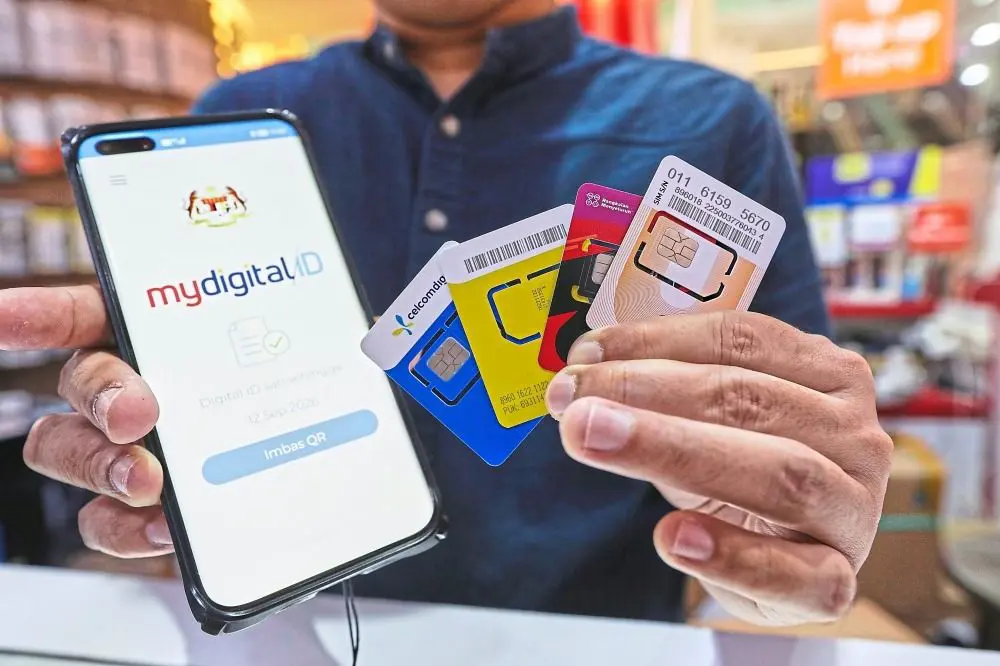 PETALING JAYA: Malaysia’s push to link prepaid SIM registration with MyDigital ID is viewed as a crucial step to combat rampant scams; however, some experts express concerns it could undermine consumer privacy.Malaysian Cyber Consumer Association (MCCA) president Siraj Jalil said they have been advocating for this initiative since January.
PETALING JAYA: Malaysia’s push to link prepaid SIM registration with MyDigital ID is viewed as a crucial step to combat rampant scams; however, some experts express concerns it could undermine consumer privacy.Malaysian Cyber Consumer Association (MCCA) president Siraj Jalil said they have been advocating for this initiative since January.
“We urged the government not only to reform prepaid SIM registration with MyDigital ID but also to track down the supply chain where registered SIM cards are sold illegally.
“This initiative by the government is crucial, as scammers widely use registered SIM cards to conduct their illegal operations,” said Siraj.
On Wednesday, CommunicaÂtions Minister Datuk Fahmi Fadzil announced that all telecommunications companies in the country would be instructed to implement MyDigital ID in the prepaid SIM registration Âprocess.
Fahmi said the policy would be enforced by the end of the year.
The measure, he added, would close loopholes in the existing system and prevent any potential misuse.
Meanwhile, Siraj pointed out agents and resellers are selling prepaid SIM cards in bulk on e-commerce platforms for as low as RM2.50 each.
This makes it easy for criminals to acquire and use them for fraudulent activities, he added.
“All they have to do is just top up and start using these SIM cards,” said Siraj.
The authorities encounter significant challenges in identifying the actual users of the SIM cards, as these cards may have even been sold to foreigners.
“So, having a proper verification system like MyDigital ID can mitigate these issues, as it serves to activate the SIM cards.”
Siraj also emphasised the need to strengthen digital borders by requiring strict registration for foreigners’ phone lines, suggesÂting the addition of biometric checks, like thumbprints.
He cited Indonesia as an example, where identity verification is required for telco services.
Supporting this view, cyberÂsecurity specialist Fong Choong Fook said that linking a SIM card to a verified identity is an important step in establishing accountability for the user.
However, he said the government must assure the public that the MyDigital ID system is secure from data breaches.
“There has to be a great balance between flexibility and security so that the system remains user-friendly and gains public support,” Fong said.
Federation of Malaysian ConsuÂmers Associations (Fomca) secretary-Âgeneral Dr Saravanan Thambirajah, however, warned of the potential for data misuse, incluÂding for political or social monitoring.
He highlighted the risk of “scope creep”, where systems of control expand beyond their original intent.
“History demonstrates that systems of control frequently extend beyond their initial scope, despite the current focus on fraud prevention,” he said.
Saravanan also raised concerns about potential technical glitches that could disrupt access to SIM registration.
“Elderly, rural folk or those with outdated documents may struggle to use MyDigital ID and could find themselves excluded from basic telecommunications services,” he added.
This, he noted, could widen the digital divide.
However, Saravanan conceded that mandatory registration via MyDigital ID would make it more difficult for scammers to acquire and use anonymous SIM cards.
“When each SIM is tied to a verified identity, it creates a stronger link between the Ânumber and the user, making it easier to trace and potentially prosecute scammers,” he said.
“This is an important step because anonymous SIM cards have been widely misused in scams, especially in Malaysia, where prepaid penetration is very high.”
He also cautioned that fraudsters are adaptive and may Âsimply shift to other channels, such as messaging apps or phishing scams, once the SIM card loophole is closed.